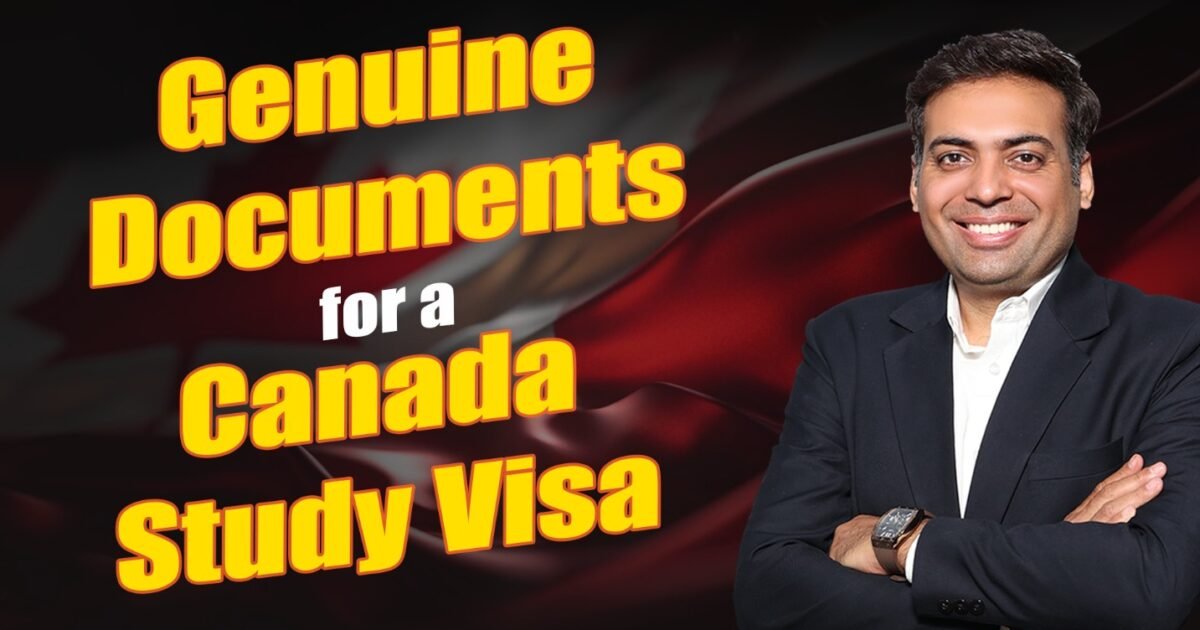Hello everyone welcome back to this Blog Globexa immigration this is Jitender Grover in this blog we are discussing about What are the Genuine Documents for Canada Study Visa? Applying for a study visa to Canada involves submitting various documents to prove your eligibility. Among these, the term “genuine documents” often comes up, and understanding it is crucial for the success of your application. In this blog post, we’ll break down what “genuine documents” are, why they’re essential, and how to ensure your documents meet the necessary criteria. This comprehensive guide will also discuss common types of documents required and the consequences of submitting false documents.
1. Introduction to Canada Study Visa Requirements
A Canada study visa, also known as a study permit, is required for international students planning to pursue academic studies in Canada. The visa application process is rigorous, and Immigration, Refugees and Citizenship Canada (IRCC) requires a variety of supporting documents. But what exactly is meant by “genuine documents” in this context? Simply put, they refer to authentic, truthful, and legally obtained documents that accurately represent the applicant’s qualifications, intentions, and circumstances.
1.1 Why Are Genuine Documents Important for Your Application?
Ensures Accurate Evaluation: Immigration authorities need reliable information to assess your eligibility.
Maintains System Integrity: Genuine documents ensure fairness in the application process.
Protects Your Future Opportunities: Fraudulent documents could lead to a ban on entering Canada for several years.
2. Key Requirements for a Canada Study Visa
Before diving into the details of genuine documents, let’s first understand the key requirements for obtaining a Canadian study visa.
Acceptance Letter: You must have an acceptance letter from a Designated Learning Institution (DLI) in Canada.
Proof of Financial Support: You need to show that you can financially support yourself while studying.
Proof of Ties to Home Country: Immigration authorities want to ensure you’ll return to your home country after completing your studies.
3. What Are Genuine Documents?
Genuine documents are authentic, unaltered, and legally acquired documents that you provide in your study visa application. These documents should be clear, accurate, and truthful representations of your circumstances.
Originals vs. Copies: Whenever possible, provide original documents. If you must submit copies, they should be notarized or certified by the issuing authorities.
No Alterations: Do not alter, forge, or tamper with any documents.
Accurate Information: All information on the documents must match your application form.
4. Common Types of Documents Required for Canada Study Visa
Here’s a closer look at the genuine documents that you will need for your study visa application:
4.1. Proof of Acceptance
What It Is: A letter from the Canadian institution confirming your acceptance into a program of study.
Why It’s Important: This proves that you’ve been officially admitted and have a valid reason to study in Canada.
4.2. Proof of Financial Support
4.3. Academic Documents
What It Is: Your academic transcripts, certificates, and diplomas from previous education.
Why It’s Important: These documents prove that you have the required qualifications for the program you’re applying to.
4.4. Valid Passport
What It Is: A valid, unexpired passport with sufficient validity for the duration of your intended stay.
Why It’s Important: It’s essential for identity verification and international travel.
4.5. Language Proficiency Test Results
What It Is: Official test results for English (IELTS, TOEFL) or French (TEF) language proficiency.
Why It’s Important: Canada wants to ensure you can communicate effectively in the language of instruction.
5. How to Ensure Your Documents Are Genuine
To avoid rejection or legal consequences, it’s vital to ensure that the documents you submit are genuine. Here’s how:
5.1. Provide Original Documents
Always submit original documents whenever possible. If copies are necessary, ensure they are certified by the issuing authority.
5.2. Obtain Documents from Authorized Sources
Ensure that all documents are obtained from recognized, official institutions. For example, transcripts should come directly from your previous educational institution.
5.3. Double-Check Your Information
Verify that the details on all documents (such as names, dates, and institutions) match across all your paperwork to avoid discrepancies.
6. The Role of Notary Services in Document Authentication
Some documents, like financial statements or affidavits of support, may need to be notarized. A notary public authenticates your documents to confirm their legitimacy.
Why Use Notary Services?
Authentication: Verifies that the document is a true representation of your situation.
Legal Assurance: Provides assurance that the document has not been altered.
Avoiding Fraud: Protects you from unknowingly submitting falsified documents.
7. Consequences of Submitting Falsified Documents
Submitting fake or altered documents can have serious repercussions for your study visa application.
7.1. Visa Denial
If the immigration authorities discover any fraudulent documents, your application will be denied.
7.2. Future Visa Complications
Even if you apply for a different visa in the future, your past involvement in document fraud will likely impact the decision.
7.3. Legal Penalties
Falsifying documents is a criminal offense and can lead to legal action, including potential prosecution.
8. How to Handle Document Discrepancies
In some cases, there may be small discrepancies in your documents. It’s essential to address them properly:
8.1. Discrepancies in Academic Records
If there’s a mistake in your transcripts or certificates, contact the institution that issued them and request a corrected version.
8.2. Financial Support Documentation
If there’s a gap in your financial documents (e.g., missing bank statements), make sure to provide an explanation or additional evidence to clarify.
9. How Long Does It Take to Process a Canada Study Visa?
The processing time for a Canadian study visa can vary depending on several factors, including the country of application, the complexity of your case, and the completeness of your documents.
Typical Processing Time
10. Conclusion: Submitting Genuine Documents Is Key to Your Success



